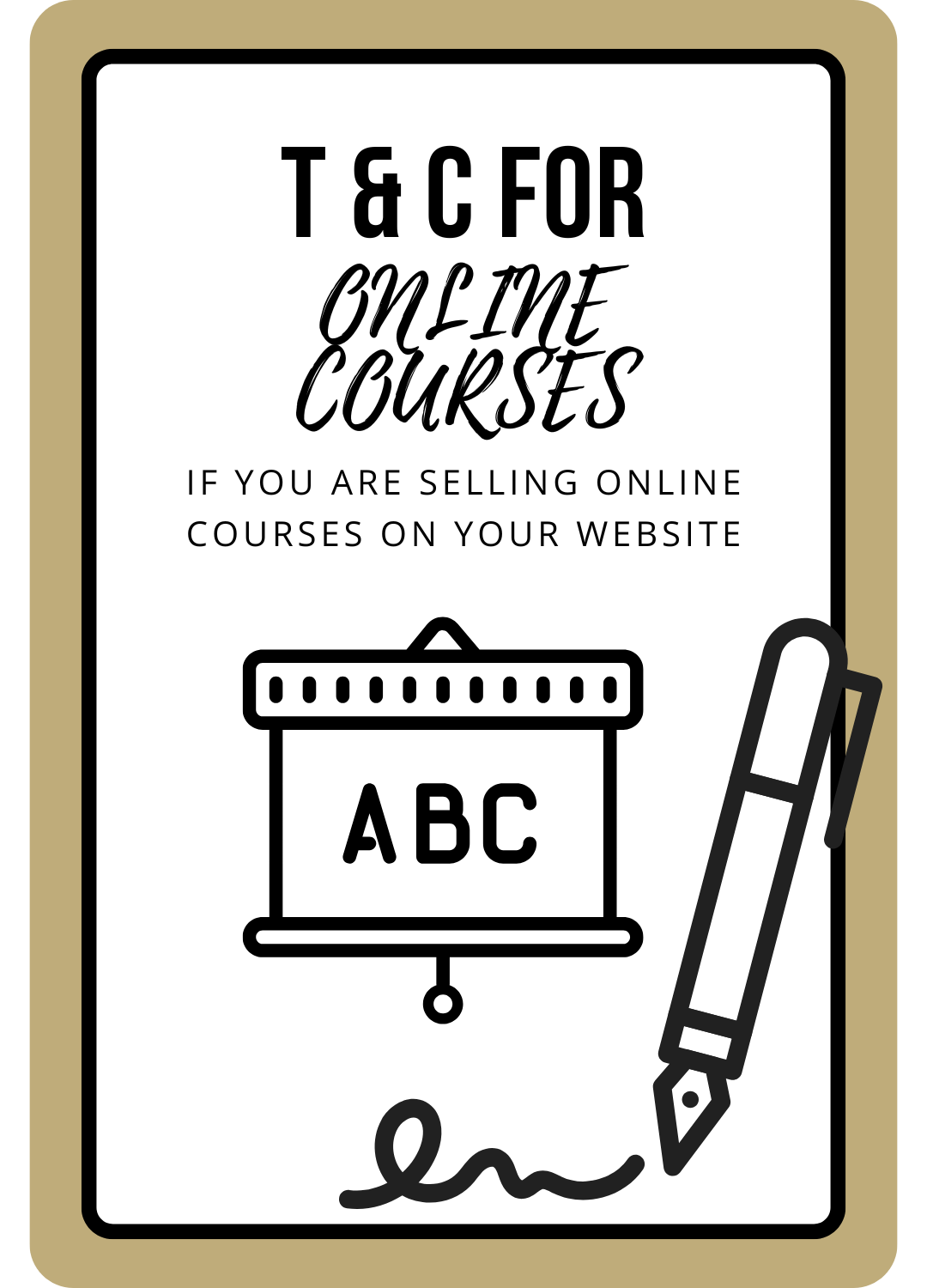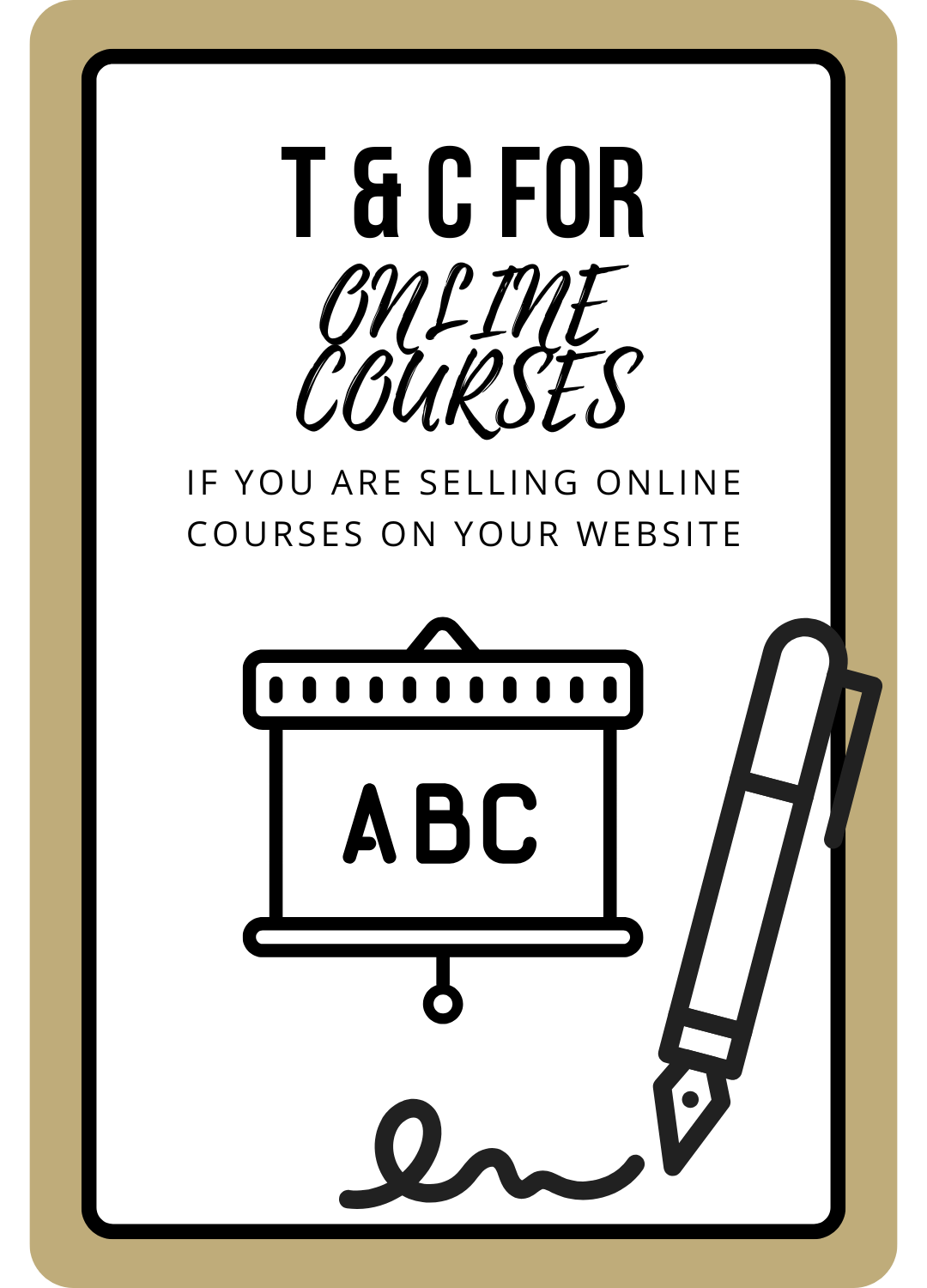11 Key Essentials Every Online Course Terms and Conditions Template Must Have (That Most Templates Miss)
Looking for an online course terms and conditions template that actually protects your business?
Most don’t. Even paid templates often miss the clauses that truly matter — the ones that protect your course content, your income, and your reputation.
As a business lawyer who’s seen hundreds of terms and conditions for online courses, I’ve seen it all: one online course terms and conditions template with vague refund terms that invite disputes, another missing IP language that lets students resell content, and generic disclaimers that wouldn’t hold up in court.
In this post, you’ll learn the 11 key essentials every online course terms and conditions template must have—and why using a generic terms and conditions generator or free template can leave your business exposed.
I’ll break down each clause in plain English with examples straight from my own terms and conditions for online courses.
This post is all about the essentials your online course terms and conditions template must include—to protect your course, your income, and your peace of mind.
Want ironclad protection for your online course right now? It’s all pre-written inside the Online Course Terms and Conditions Template — just customize it to your niche and course content and publish!
Best Online Course Terms and Conditions Template
The 11 Must-Haves for Your Terms and Conditions for Online Courses
1. Lock Down Your Course Content (So Copycats Can’t Touch It)
A student buys your course, loves it… and then uploads your videos to a membership site, promising “lifetime access” to hundreds of new followers.
Another one copies the workbook from your course and starts selling it as their own “signature method.”
That’s why your online course terms and conditions template needs to include tight intellectual property protections, including exactly what students absolutely can’t do—from redistributing your lessons to using bots or scraping your content.
Your online course terms and conditions should make it explicitly clear that:
You keep full ownership of all course content, materials, and methods.
Students receive a limited, non-transferable license for personal, educational use only.
Students can’t copy, resell, edit, share, or repurpose your lessons in any form.
The problem with most terms and conditions for online courses is that they use vague IP language like “all intellectual property is yours,” without explaining what "intellectual property" actually means—or how students can and can’t use it.
👉 My Online Course Terms and Conditions Template includes clear, ironclad content protections everyone understands—and copycats can’t get around.
2. Keep Control of Future Updates (So Students Don’t Expect Endless Freebies)
You update your course, add a few new lessons, and suddenly—students from two years ago start demanding free access to the new version.
Or you quietly refresh a few outdated modules and someone complains that “the course changed after I bought it.”
That’s why your online course terms and conditions template should include a clause that protects your right to improve, update, or expand your materials on your terms.
Here’s what it should cover:
Your right to make changes — you can amend or update the course whenever you choose.
Whether updates are included — you decide if new content is free or requires an upgrade fee.
Optional add-ons — if you offer bonus lessons or companion courses, you can charge separately without rewriting your entire agreement.
This clause keeps expectations crystal clear: students know exactly what they paid for and what’s outside the scope of their purchase.
👉 My Online Course Terms and Conditions Template is fully customizable to fit your business model—just choose whether updates are included or sold separately.
3. Set Boundaries for Third-Party Links (So You’re Not Liable for What Others Post)
You share a link to a helpful resource or tool inside your course. A few months later, that website changes its content—or even disappears entirely—and a student blames you for recommending it.
That’s why your online course terms and conditions template needs a clause that protects you when your course includes external materials, affiliate links, or recommendations you don’t control.
This clause clarifies that:
You’re not responsible for the accuracy, safety, or reliability of third-party sites or products.
Students visit and purchase at their own risk and must do their own due diligence.
Any affiliate relationships are transparent, so you comply with affiliate marketing laws.
Even if you never use affiliate links, it’s smart to keep this clause—it shields you from any changes, outages, or misleading claims made by others.
👉 Fully covered in the Online Course Terms and Conditions Template—so your recommendations help your students, not hurt your business.
4. Manage Your Private Group (Without Taking Responsibility for What Happens Inside)
You create a private Facebook group for your students—a friendly space for connection and support. But soon, someone starts posting misleading information, heated debates break out, and another member complains you didn’t moderate it properly.
That’s why your online course terms and conditions template should include a clause that clearly explains the limits of your responsibility within any community linked to your course.
This clause establishes that:
You may offer access to a private group (like Facebook or Circle), but it’s not part of the paid course itself.
You’re not liable for what other members post, say, or share.
Students must behave respectfully and avoid offensive, defamatory, or illegal content.
You can moderate, remove, or ban anyone at your sole discretion if they break the rules (without owing them a refund).
👉 Already written for you in the Online Course Terms and Conditions Template—so you can nurture your community without taking on their liability.
Bonus: It also covers ownership of what members post—so if a student shares a testimonial or success story, you have permission to reuse it for marketing.
5. Get Consent for Recordings (So You Can Reuse Live Sessions Legally)
You host a live Zoom session with your students—everyone’s on camera, interacting, asking questions. Later, you’d love to turn that session into a bonus video or use a clip for marketing… but without clear consent, you legally can’t.
That’s why terms and conditions for online courses should (but most often don't) give you the right to record, reuse, and repurpose your live calls while protecting you from privacy complaints and claims for intellectual property infringement later.
A proper online course terms and conditions template free of fluff should make clear that:
Students consent to being recorded if they participate in live sessions.
You may store, edit, and share recordings with current or future students.
You can repurpose clips for business, marketing, or educational use—if you plan to.
Students waive rights of approval or compensation for any use of those recordings.
This single clause can save you hours of back-and-forth (and potential headaches) if you ever want to repurpose your recorded content.
👉 Already built into the Online Course Terms and Conditions Template—just choose whether you’ll use recordings for internal or promotional purposes.
6. Spell Out Your Payment Terms (So You Can Suspend Access When They Don’t Pay)
You offer a payment plan, and after the first installment, a student’s card declines. They still have full course access—and keep watching your modules while you chase unpaid invoices.
That’s why your online course terms and conditions template should include a detailed payment clause that protects your right to get paid in full and gives you leverage when payments fail.
Here’s what it should cover:
When and how payments are due — full upfront, in two parts, or multiple installments.
Access control — you can restrict how much of the course they may access, based on the installments actually paid.
Late payment fees and collection rights — so you’re compensated for delays.
Chargebacks and cancellations — making clear that access is revoked if a payment fails or is reversed.
👉 Already written inside the Online Course Terms and Conditions Template—just select your payment options.
It can even specify that you may pause access to both the course and any community platforms until overdue balances are cleared. This clause keeps your cash flow predictable and your policies enforceable—without awkward follow-ups or unpaid “forever students.”
7. Define Your Refund Policy (So You Don’t End Up Losing All Your Money)
A student finishes your course, downloads every workbook, and then emails: “I didn’t get the results I expected, so I want a refund.”
Without a clear refund policy, you could be legally forced to issue refunds you never intended to allow.
That’s why your online course terms and conditions template should include a refund policy clause that removes ambiguity and sets boundaries upfront—so you stay in control of your income and don't lose it all.
It should clearly state:
Whether refunds are available (and under what conditions).
How much is refunded if applicable (100%? 50%?)
What time limits apply, for example, “within 7 days of purchase” or “before accessing 25% of the content.”
If you offer a satisfaction guarantee, what proof students must provide to qualify?
A solid refund clause protects you from refund abuse by people who treat online courses like free trials—and reassures genuine students that your policy is fair and transparent.
👉 Fully customizable inside the Online Course Terms and Conditions Template—choose between a no-refund, pro-rata, or satisfaction-guarantee setup.
🛡️ Get an Online Course Terms and Conditions Template That Actually Protects Your Course
Every clause you’ve read so far is already written for you inside the Online Course Terms and Conditions Template — just choose what fits your business model and publish.
Here’s what you’ll get:
✅ Ready-to-use legal language that covers real risks for course creators.
✅ Built-in flexibility — choose whether updates, refunds, or recordings are included.
✅ Professional disclaimers tailored for your niche (from coaching to finance to fitness).
✅ Clear IP protection so your content stays yours — no matter who enrolls.
✅ Editable Word format you can customize in minutes.
Need more than just a single course contract?
You’ll find it in the Digital Product Business Bundle — everything you need to protect your online courses, eBooks, and downloads.
8. Reserve the Right to Restrict Access (So You Can Kick Out Problem Students)
A student violates your terms—maybe they share course materials, miss payments, or behave inappropriately in your group.
You want to revoke their access immediately, but your terms don’t say you can, and they've already paid the full amount.
That’s why your online course terms and conditions template should include an access restriction clause. It gives you full control to suspend, restrict, or terminate access to your course, platform, or community if a student breaks your rules.
This clause should state that you can:
Revoke access to the platform, group, or course materials at any time if terms are breached.
Suspend access temporarily for non-payment or misconduct.
Remove or ban users who violate your policies or disrupt other students’ learning experience.
It keeps your course safe, your reputation professional, and your authority clear—without needing to justify or negotiate every decision.
👉 Already included in the Online Course Terms and Conditions Template—so you can enforce your boundaries and protect your business confidently.
9. Define How Long Access Lasts (So Students Don’t Claim “Lifetime” Access Forever)
You promote your course as “lifetime access,” meaning students can watch it as long as it’s available on your platform. A year later, you switch learning systems or retire the program—and a student demands access forever.
That’s why your online course terms and conditions template should include a clear term & termination clause that explains exactly when access begins and ends, and under what conditions you can end the agreement and the course itself.
It should clarify:
When access starts (typically upon registration or first payment).
How long access lasts — whether for a set period (e.g., 12 months) or as long as the course is available.
When the agreement ends automatically — for example, if you discontinue the course or terminate access for breach.
Which obligations survive termination, like payment, confidentiality, and intellectual property rights.
This clause prevents confusion around “lifetime access” and ensures you can retire or update your course without facing complaints or refund demands.
👉 All these options are included in my Online Course Terms and Conditions Template—just choose between limited or lifetime access.
10. Add Tailored Disclaimers (So You’re Not Held Liable for Students’ Results)
A student applies your course advice, doesn’t get the outcome they expected—and blames you.
Another interprets your content as professional advice and threatens to take legal action because they “relied on your expertise.”
That’s why your online course terms and conditions template needs strong disclaimers that limit your liability and set realistic expectations for results.
Here's a list of some of the disclaimers that terms and conditions for online courses should cover:
General disclaimers — clarifying that your course is for informational and educational purposes only.
Professional scope — explaining that your course doesn’t create a professional relationship or replace qualified advice.
Technology and access disclaimers — covering platform downtime, tech errors, or compatibility issues.
Niche-specific disclaimers — tailored to your course topic and student risks. For example:
Health & Fitness – confirms your course isn’t medical advice or treatment.
Financial & Legal – makes clear you’re not giving tax or legal advice.
Mindset & Personal Development – protects against claims of psychological harm or “unqualified therapy.”
Cooking, DIY, or Risk-Based Courses – limits liability for injuries or property damage.
Sensitive or Controversial Topics – shields you from claims of offence or emotional distress.
Most terms and conditions examples only include a generic online course disclaimer at most, but that’s not enough. Each niche carries its own risks—and if your disclaimers don’t match your content, you’re still exposed.
👉 Every disclaimer—general and niche-specific—is already included and customizable inside my Online Course Terms and Conditions Template—so your protection actually fits what you teach.
11. Prevent Defamation & Misuse (So Students Can’t Damage Your Brand)
A student becomes difficult and refuses to follow the course, and later posts online that your course was a “scam.”
Another gets frustrated halfway through your course and starts venting publicly that “it’s not what was promised.”
A non-disparagement & prohibited use clause protects your brand and sets professional boundaries by making clear that students must not:
Disparage or discredit you, your business, or your team.
Share or repurpose your content in a misleading or defamatory way.
Imply endorsement or partnership with your brand without written consent.
Engage in illegal, offensive, or unethical behavior that harms your reputation or community.
Ironclad terms and conditions for online courses should also give you the right to remove or ban anyone who breaches these rules—without refund obligations.
The ULTIMATE Online Course Terms and Conditions Template Free of Fluff
If you’ve made it this far, you already know: your course deserves better than a generic terms and conditions generator or a random template pulled from Google.
Every clause we covered — from IP protection and refunds to disclaimers and reputation safeguards — is already written and ready to use in my Online Course Terms and Conditions Template.
Here’s what you’ll gain when you use it:
✅ Professional-grade protection written by a lawyer for online educators.
✅ Customizable options for updates, refunds, and live sessions.
✅ Built-in disclaimers tailored to your specific niche and student risks.
✅ Instant clarity on what students can and can’t do — in plain English.
✅ Peace of mind knowing your business, brand, and income are legally safeguarded.
Or, if you sell multiple digital products, courses, or eBooks — upgrade to the Digital Product Business Bundle for complete coverage across your online business.
FAQs About Online Course Terms and Conditions (and Why a Terms and Conditions Generator Won't Suffice)
1. What should terms and conditions for online courses include?
Your terms and conditions should clearly outline how students can use your course, what they’re paying for, your refund policy, disclaimers, and your ownership of all content. You should also include clauses on updates, community rules, access duration, limitations of liability, and dispute resolution.
All 11 essentials (+ more) are already built into my Online Course Terms and Conditions Template—just choose the terms that fit your course and business model.
2. Do I really need terms and conditions for my online course?
Yes. Without them, you’re legally unprotected if a student requests an unfair refund, shares your content, or misuses your materials. Proper terms and conditions for online courses protect your income, your intellectual property, and your reputation.
3. Can I use a free terms and conditions generator for my course?
You can—but you shouldn’t. Templates created by a terms and conditions generator are usually not fully tailored to your niche and are simply too generic. They often lack key protections like niche-specific disclaimers, rules for private groups, rights to record live sessions, or detailed content protection clauses.
A tailored Online Course Terms and Conditions Template like mine is written specifically for online courses of all types, in plain English, and covers every major risk you face.
4. How do I customize the online course terms and conditions template?
Simply replace placeholders (like your business name, location, or course name) and choose which options apply—such as whether updates are free or paid, your preferred payment terms, refund policy, niche-specific disclaimers, or whether recordings can be reused.
My Online Course Terms and Conditions Template comes in an editable Word format and includes guidance notes beside every clause, so you always know what to keep or adjust.
5. What disclaimers should my online course include?
The right online course disclaimer depends on your niche. For example, coaching, fitness, financial, and legal courses each need different disclaimers to limit liability and manage student expectations.
My Online Course Terms and Conditions Template includes all the general and niche-specific disclaimers you need—so your protection fits what you teach.
6. Can I include my online course terms and conditions on my website?
Yes. You can upload them to your checkout page, so customers are required to check a box agreeing to them before purchase. You can use them on the checkout page of your own website, but also on Teachable, Kajabi, Podia, Stan Store, Thinkific, or LearnWorlds. The key is that students must explicitly agree before buying for the terms to be enforceable.
This post was all about the 11 key essentials your online course terms and conditions template needs to keep your business protected, your content secure, and your boundaries clear..
Other posts you may like:







